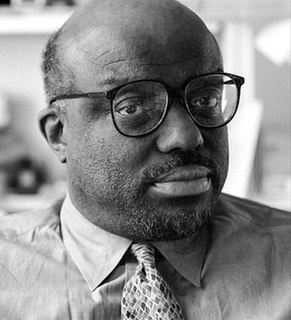A Quote by Patrisse Cullors
When folks say 'identity politics' don't matter, it simply reinforces the norm of a white, middle-class, cis narrative and further marginalizes the rest of us who don't share that identity.
Related Quotes
Perception, after all, is not simply a matter of what you believe about yourself, it all encompasses what others think about you, and what has been thought of you historically. I say we can pay attention to those other dimensions of our identity - class, gender, sexual orientation, geographical region - while at the same time understanding how our historically produced racial identity continues to serve, or undercut us.
If most of the reviewers are white cis men, if most of the distributors are white cis men, most of the executives in history have been white cis men. Most of the people who have been giving awards to people are people who've already been in the business - retired white cis men. They've been creating a body of narrative forever.
Why would one's identity be a matter of feelings? I think that that's a misuse of terms, philosophically. Identity is mind independent. It's something that is objective, regardless of how you feel. So, the term gender identity seems to me to be something of an oxymoron. It's not really about one's identity. It's rather a matter of one's self-perception or one's feelings about oneself.
The identity of just one thing, the "clash of civilization" view that you're a Muslim or a Hindu or a Buddhist or a Christian, I think that's such a limited way of seeing humanity, and schools have the opportunity to bring out the fact that we have hundreds of identities. We have our national identity. We have our cultural identity, linguistic identity, religious identity. Yes, cultural identity, professional identity, all kinds of ways.
I'm just challenging white supremacy at its intellectual heart every day. It's a pedagogy that I deploy against some of the most vicious resistance to blackness that whiteness is able to throw up. I engage in a lot of intellectual combat with supremacists and with the predicate of white supremacy and white indifference to black identity, and brown and red and yellow identity too, for that matter.
What the left ends up missing is that politics have always been at the heart of American culture; it's been a white identity that's been rendered invisible and neutral because it's seen as objective and universal. As a result, we don't pay attention to how whiteness is one among many racial identities, and that identity politics have been here since the get-go.
In this society, the norm of masculinity is phallic aggression. Male sexuality is, by definition, intensely and rigidly phallic. A man's identity is located in his conception of himself as the possessor of a phallus; a man's worth is located in his pride in phallic identity. The main characteristic of phallic identity is that worth is entirely contingent on the possession of a phallus. Since men have no other criteria for worth, no other notion of identity, those who do not have phalluses are not recognized as fully human.


































